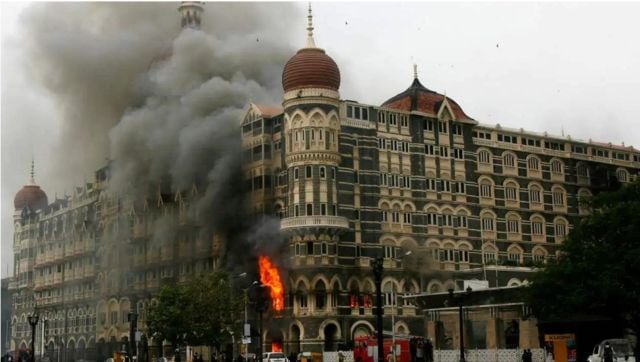It has been 16 years since the horrific terror attacks that shook India’s financial capital, Mumbai, on November 26, 2008.
Commonly referred to as the
26/11 terror attacks, the 12 coordinated shootings and bombings were carried out by a group of 10 Lashkar-e-Taiba (LeT) terrorists.
The
Pakistan-based terrorists, who arrived by hijacking an Indian fishing boat via Colaba, attacked the city’s iconic locations such as the Chhatrapati Shivaji Terminus, Leopold Café,
Nariman House, and two luxury hotels — the Oberoi Trident and the Taj Mahal Palace Hotel.
The Taj Hotel was the main site of the assault, which killed 175 and injured more than 300 people.
In the wake of the fateful event,
Ratan Tata, the Tata Group’s Chairman at the time, showed incredible courage.
Let’s take a look.
The attacks began at around 9.30 pm on November 26, 2008, when gunmen stormed the Taj Hotel, taking hostages and engaging in intense firefights with security forces.
There were six explosions reported at the iconic hotel, including blasts in the lobby, elevators, and restaurants.
The hotel remained under a 60-hour siege and 33 out of the 166 people were killed, including guests.
According to Harvard Business Review, about
11 hotel employees laid down their lives while helping over 1,200-1,500 guests escape. The staff asked guests to hide under tables, offered water, and formed a human cordon to evacuate them in an orderly manner before turning to help the firefighters.
Security personnel and firefighters worked tirelessly to rescue hostages; however, the situation was brought under control only after three days.
Ratan Tata, who
passed away on October 9, 2024, at the age of 86, was then serving as the Chairman of Tata Group, which owns the iconic hotel.
The Padma Vibhushan recipient, who led the group for over two decades, stood like a pillar even as black fumes rose from the hotel, and the rescue operation went on to save those stranded in the hotel.
Tata spent the entire day at the hotel’s Colaba end as the rescue effort went on, occasionally by himself and other times with staff and aides.
Later, Tata recalled the event and said, “About 37 or 40 in our hotel were shot and killed for no reason. And then it became an issue that you stand by it and let this happen or go into the midst of what was like a war zone and stand with your employees and go to the homes of people who were killed.”
Taking to X, actor Kamal Hasaan said, “In the immediate aftermath of the 2008 Mumbai attacks, I met him while staying at the iconic Taj Hotel. In that moment of national crisis, the titan stood tall and became the embodiment of the Indian spirit, to rebuild and emerge stronger as a nation.”
Tata shared a post on Instagram in November 2019 to mark 11 years of the attacks, saying that the “memory of standing outside helpless and of the carnage and loss of life, are still fresh and painful.” “We will not forget the scars and the needless suffering caused at the hospital, the railway station, the hotels and across the city. But most importantly, we remain proud of the spirit and the sense of unity displayed by Mumbai in all its power on that day. I will say it again: We can be hurt, but not knocked out.”
The following year, he shared a hotel’s painting with a caption, “We remember.”
In 2020, he said that the wanton destruction that took place 12 years ago today will never be forgotten. In an Instagram post, he further praised the people of Mumbai for casting aside all differences and its unity.
The hotel, which was established in 1903 by Ratan Tata’s great-grandfather, Jamstedji Tata, had never closed its doors in over a century. In fact, during World War II, the hotel served as a makeshift hospital.
The Mumbai terror attacks were the first time in its history that it was forced to shut down.
Despite tremendous damage, the Taj Hotel reopened just a month after the attack.
However, it took longer to restore its legacy… In 21 months, Tata spent more than $1 billion to finish the restoration of the hotel.
One year after the attack in 2009, Tata unveiled a memorial at the hotel to honour the employees and guests who lost their lives in the attack.
The industrialist also pledged to take care of the families of those killed and injured.
According to the BBC, he paid the relatives of those killed the salaries “they would have earned for the rest of their lives,” and also ensured their children received proper education. Some reports even say that Tata had visited the homes of the victims to ensure their well-being.
In a few months, the Tata Group formed The Taj Public Service Welfare Trust (TPSWT) to provide humanitarian support during disasters.
Mourning Tata’s demise, Prime Minister Narendra Modi mentioned the 26/11 Mumbai attacks, and said, “For crores of Indians, Shri Ratan Tata’s patriotism shone brightest in times of crisis. His swift reopening of the iconic Taj Hotel in Mumbai after the 26/11 terror attacks was a rallying call to the nation – Indian stands united, refusing to yield to terrorism.”
With inputs from agencies
Link to article –
26/11: When Ratan Tata stood on pavement outside Taj Hotel while hostages were rescued

